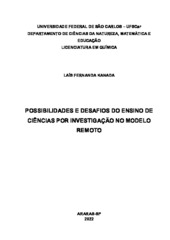| dc.contributor.author | Kanada, Laís Fernanda | |
| dc.date.accessioned | 2022-06-20T19:29:47Z | eng |
| dc.date.available | 2022-06-20T19:29:47Z | eng |
| dc.date.issued | 2022-04-13 | eng |
| dc.identifier.citation | KANADA, Laís Fernanda. Possibilidades e desafios do ensino de ciências por investigação no modelo remoto. 2022. Trabalho de Conclusão de Curso (Graduação em Química) – Universidade Federal de São Carlos, Araras, 2022. Disponível em: https://repositorio.ufscar.br/handle/ufscar/16299. | * |
| dc.identifier.uri | https://repositorio.ufscar.br/handle/ufscar/16299 | por |
| dc.description.abstract | Science teaching in Brazil is in an unfavorable situation in relation to what would be ideal, mainly in the remote format that the pandemic has subjected all those involved in the educational process in the years 2020 and 2021. It is understood that this lag emphasized in remote teaching is a baggage of the lack of investment in education by the government, due to the low assimilation between the scientific content and the student, and by the absence of teaching methodologies that propitiate the insertion of young people in the scientific environment. For this reason, a teaching by investigation format, as the one proposed in this work, brings a possibility that reduces this problem by obtaining scientific knowledge through intellectual freedom of young people and for the investigations that they themselves raise based on a problem situation presented by the teacher. The present work sought to observe the possibilities and challenges of the application of teaching by investigation in the remote modality through the comparison of the parallel development of the activity in the face-to-face mode with students from the same classes of a public school in the city of Limeira/SP, where the author worked as a science teacher. As a result of this experience, two relevant points were raised. The first was that, regardless of whether applied in the remote or face-to-face model, teaching by investigation entourages more student participation and allows for more effective learning. And the second observation is that the remote model significantly reduces, almost eliminating, the student-teacher and student-student interaction, failing in the debates and joint construction of knowledge that the face-to-face model propitiates. This way, some adjustments can be made in order to allow a more expansive interaction, consequently increasing the quality of the methodology for the remote model of teaching, either soon with the technological evolution or, even, another chaos that requires this school isolation. | eng |
| dc.description.sponsorship | Não recebi financiamento | por |
| dc.language.iso | por | por |
| dc.publisher | Universidade Federal de São Carlos | por |
| dc.rights | Attribution-NonCommercial-NoDerivs 3.0 Brazil | * |
| dc.rights.uri | http://creativecommons.org/licenses/by-nc-nd/3.0/br/ | * |
| dc.subject | Metodologia pedagógica | por |
| dc.subject | Grau de liberdade intelectual | por |
| dc.subject | Pandemia | por |
| dc.subject | Aulas remotas | por |
| dc.subject | Recursos tecnológicos | por |
| dc.subject | Pedagogical methodology | eng |
| dc.subject | Degree of intellectual freedom | eng |
| dc.subject | Pandemic | eng |
| dc.subject | Remote classes | eng |
| dc.subject | Technological resources | eng |
| dc.title | Possibilidades e desafios do ensino de ciências por investigação no modelo remoto | por |
| dc.title.alternative | Possibilities and challenges of investigative science teaching in the remote model | eng |
| dc.type | TCC | por |
| dc.contributor.advisor1 | Milaré, Tathiane | |
| dc.contributor.advisor1Lattes | http://lattes.cnpq.br/4030661520659155 | por |
| dc.description.resumo | O ensino de Ciências no Brasil está em situação desfavorável em relação ao que seria o ideal, principalmente no formato remoto que a pandemia submeteu todos os envolvidos no processo educacional nos anos de 2020 e 2021. Entende-se que essa defasagem enfatizada no ensino remoto é uma bagagem da falta de investimento na educação por parte do governo, pela baixa assimilação entre os conteúdos científicos e o estudante e pela ausência de metodologias de ensino que propiciem a inserção dos jovens no meio científico. Por esse motivo, um formato de ensino por investigação, como o proposto neste trabalho, traz uma possibilidade que reduz essa problemática através da obtenção do conhecimento científico por liberdade intelectual dos jovens e por investigações que eles mesmos levantam com base em uma situação problema apresentada pelo docente. O presente trabalho buscou observar as possibilidades e os desafios da aplicação do ensino por investigação na modalidade remota através da comparação do desenvolvimento paralelo da atividade no presencial com estudantes das mesmas turmas de uma escola pública da cidade de Limeira/SP, onde a autora atuou como professora de Ciências. Como resultado da experiência vivenciada, foram levantados dois pontos relevantes. O primeiro foi que, independente se aplicado no modelo remoto ou presencial, o ensino por investigação instiga mais a participação dos estudantes e permite uma aprendizagem mais efetiva. E a segunda constatação é que o modelo remoto diminui significativamente, quase que anulando, a interação estudante-professor e estudante-estudante, falhando nos debates e construções de conhecimentos conjuntas que o presencial propicia. Desta forma, alguns ajustes poder ser tomados a fim de permitir uma interação mais expansiva, consequentemente, aumentando a qualidade da metodologia para o modelo remoto de ensino, seja em breve com a evolução tecnológica ou, até mesmo, outro caos que necessite deste isolamento escolar. | por |
| dc.publisher.initials | UFSCar | por |
| dc.subject.cnpq | CIENCIAS HUMANAS::EDUCACAO::ENSINO-APRENDIZAGEM | por |
| dc.publisher.address | Câmpus Araras | por |
| dc.contributor.authorlattes | http://lattes.cnpq.br/1242762530594244 | por |
| dc.publisher.course | Química - QL-Ar | por |

